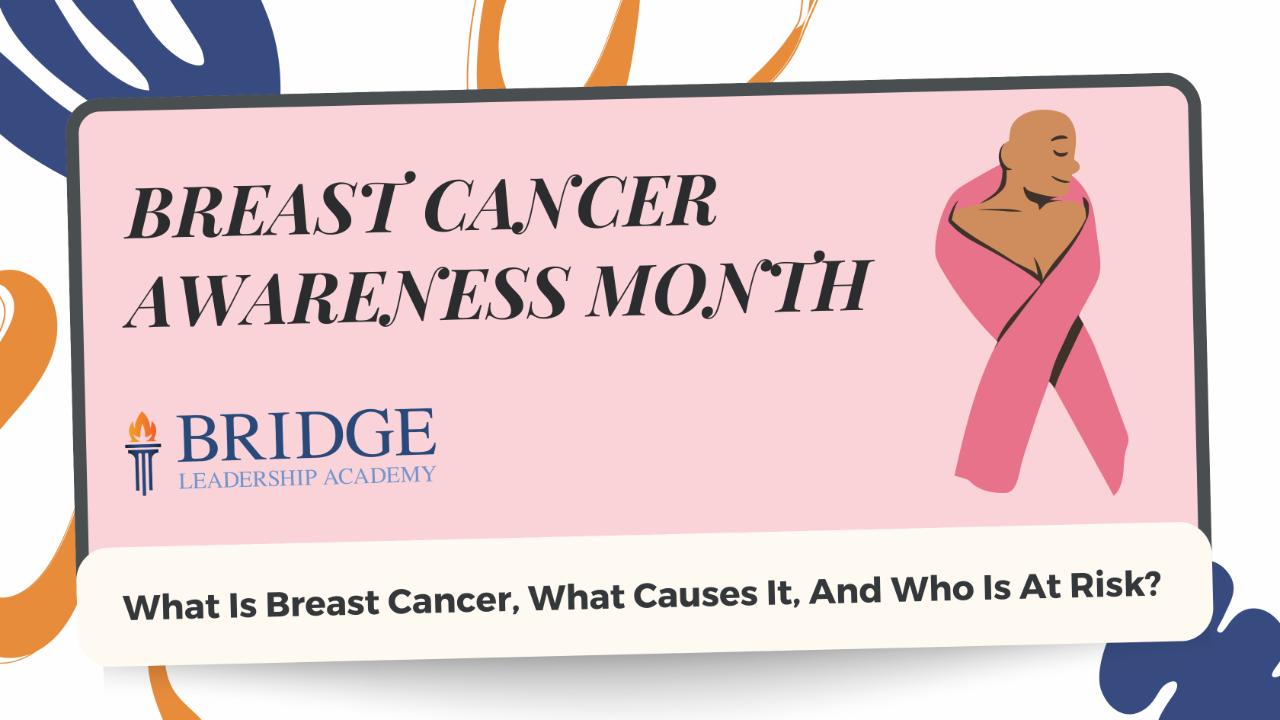Breast Cancer Awareness Month
Oct 09, 2022
What Is Breast Cancer, What Causes It, And Who Is At Risk?
The cause of each individual case of breast cancer does not always have a determinable cause. Cancer occurs when some breast cells begin to grow abnormally and rapidly multiply. There are causes that are due to controllable factors, and uncontrollable factors that can all increase your risk of getting breast cancer. Examples of controllable factors include your exercise and eating habits, hormone issues, pregnancy and breastfeeding, and drinking alcohol or not. Examples of uncontrollable factors include your assigned gender at birth, age, inheriting certain genes from your parents, having other breast conditions, being taller, etc.
What Are The Symptoms Of Breast Cancer And How Do You Self Identify It?
Breast Cancer symptoms typically manifest in the form of new changes to the breast tissue, including:
- New lump in the breast or underarm (armpit).
- Thickening or swelling of part of the breast.
- Irritation or dimpling of breast skin.
- Redness or flaky skin in the nipple area or the breast.
- Pulling in of the nipple or pain in the nipple area.
- Nipple discharge other than breast milk, including blood.
- Any change in the size or the shape of the breast.
- Pain in any area of the breast.
There are other conditions with these symptoms that are not breast cancer, and it is normal for breasts to change when on your period, taking certain medications, as you age, etc. However, you should always get yourself checked out by a doctor if you think you may be experiencing symptoms of breast cancer. Even if you never experience these symptoms you should always go in for your first breast examination, or mammogram at age 40. Mammograms may be able to detect breast cancer early and can decrease your chance of dying from breast cancer.
Breast Cancer Prevention
Remember how there are controllable and uncontrollable factors that can increase your risk of breast cancer? Well now it’s time to talk about them. While obviously, there is nothing you can do about uncontrollable factors such as your genetic makeup, there are things you can do/ control to lessen your risk of getting breast cancer.
-Staying Physically Active
“Exactly how physical activity might reduce breast cancer risk isn’t clear, but it may be due to its effects on body weight, inflammation, and hormone levels. Women who are overweight tend to have higher blood insulin levels. Higher insulin levels have been linked to some cancers, including breast cancer, and regular physical activity will help most people maintain healthy weights. The American Cancer Society recommends that adults get 150 to 300 minutes of moderate intensity or 75 to 150 minutes of vigorous intensity activity each week (or a combination of these). Getting to or going over the upper limit of 300 minutes is ideal.” (ACS)
-Limiting Alcohol Intake
“Drinking alcohol is clearly linked to an increased risk of breast cancer. The risk increases with the amount of alcohol consumed. Women who have 1 alcoholic drink a day have a small (about 7% to 10%) increase in risk compared with those who don't drink, while women who have 2 to 3 drinks a day have about a 20% higher risk. Alcohol is linked to an increased risk of other types of cancer, too.” (ACS)
-Choosing The Right Birth Control
“There's some evidence that hormonal contraception, which includes birth control pills and IUDs that release hormones, increases the risk of breast cancer. But the risk is considered very small, and it decreases after you stop using hormonal contraceptives.” (ACS)
-Eating The Right Foods
Plant foods are rich sources of fiber, antioxidants and phytochemicals which have been shown to decrease the risk of cancer and protect the body from other chronic diseases such as diabetes and heart disease. Other foods that may help include healthy fats, such as:
- Olive oil
- Avocado
- Nuts
- Seeds
- Fatty fish (like salmon, mackerel, sardines, and arctic char)
When looking at foods to avoid, alcohol is not the only one on the list. “A high intake of sugar can increase insulin levels as well as encourage weight gain, both possibly leading to cancer. Limit concentrated sweets, added sugar from processed foods, and sugary beverages” (Stanford Healthcare).
Debunking Breast Cancer Myths
(Pulled From BreastCancer.org)
FALSE: If I don’t have a family history of breast cancer, I won’t get it.
TRUE: Only about 5–10% of breast cancers are believed to be hereditary, meaning they’re caused by abnormal changes (or mutations) in certain genes passed from parent to child. The vast majority of people who get breast cancer have no family history.
FALSE: Using underarm antiperspirant can cause breast cancer.
TRUE: There is no evidence of a link between antiperspirant use and breast cancer.
FALSE: If you maintain a healthy weight, exercise regularly, eat healthy, and limit alcohol, you don’t have to worry about breast cancer.
TRUE: Although these behaviors can help lower breast cancer risk, they can’t eliminate it.
FALSE: Men do not get breast cancer; it affects women only
TRUE: While men may not have breasts like women, they still have breast tissue which means they are able to get breast cancer. each year it is estimated that approximately 2,190 men will be diagnosed with breast cancer and 410 will die.Men carry a higher mortality than women do, by 25%, primarily because awareness among men is less and they are less likely to assume a lump is breast cancer, which can cause a delay in seeking treatment.
Sources Cited:
https://www.cancer.org/cancer/breast-cancer/about/how-does-breast-cancer-form.html
https://www.nationalbreastcancer.org/breast-cancer-myths/
https://www.breastcancer.org/facts-statistics/myths-vs-facts

